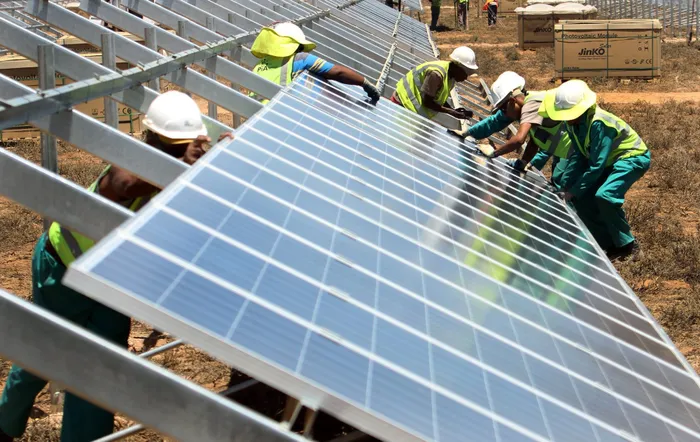Shell invests over R7.5 million for solar power installation in Estcourt community

Workers of PiA solar fits a solar panel in De Aar , Nothern Cape. Photo : Nicholas Rama
WHILE Shell South Africa was known to be predominantly a company known to be primarily involved in liquid fuels, but was now also a company that was now in transition, according to Hloniphizwe Mtolo, the Country Chairperson of Shell Companies South Africa.
Speaking to the Business Report on the side-lines of an event held in Escourt on Tuesday, Mtolo said Shell South Africa was making a contribution to resolving the electricity challenges by investing over R7.5 million for solar power installation in the Estcourt community.
Through this initiative, Shell was powering progress by installing tier 4 solar systems in over 200 homes. The solar panels installed, could power televisions, radios, fridges and charge most electrical devices. This would reduce some level of inconveniences that the community was facing due to lack of energy in this area.
Mtolo said that in many parts of the world, they were leading the energy transition journey. “This is not something that we will not be known for in future. In the future we will be known for such projects because we are starting to tap into other areas,” Mtolo said.
“Decarbonisation is important to us, hence we are in this space. It is not something that is very far from what we do. It is still energy and energy transition. We are on that journey now to bring in new and cleaner energy into the communities where we operate.”
The head of the company primarily involved in the Retail and Commercial Fuels, Lubricants and Oils, Chemicals, Manufacturing and Upstream Exploration said this was a long journey. Mtolo said that it is a transition and they were still at the beginning of the energy transition. He said that they wanted to contribute from a societal point of view but also as they built businesses, these were the kinds of businesses that they would be building for the future of local companies in the country.
The company said that the project that they were doing in this area of putting solar systems to at least 200 homes would continue over the next 3 years to ensure that they continued to make sure their presence was really felt in this area.
Mtolo said that when considering their other businesses, for instance their service stations, they have started putting solar panels in a number of them. He said that they were also doing feasibility studies to look at putting solar panels on their depots as well which was all part of their transition.
“We are also monitoring very closely the advancements in terms of vehicles. We are looking at where do we put electric vehicle charging points because that is where the world is going to and that is where we are also going to make sure that this energy transition is meaningful. We are very committed to the carbon reduction programme,” he said.
The company said that it had been in South Africa for 120 years and had done many things in this period. “We are not going to stop now to find ways of being in tune with society and making a contribution to nation-building,” Mtolo said.
According to Global Energy Perspective 2022 report developed by Energy Insights in collaboration with McKinsey Sustainability and the Global Energy and Materials and Advanced Industries published in April this year, global demand for energy was rising, driven by a growing population with rising living standards. By 2050 the number of people on the planet was forecast to grow to 9 billion(nearly 2 billion more of us than today). Many people in emerging economies were said to join the global middle class, buying refrigerators, computers and other appliances that consumed energy. More would also buy cars, more than doubling the number on the road. As cities increasingly provided the heartbeat of our economy, around three-quarters of the world’s population would live in cities by mid-century, putting more pressure on the food, water and energy resources essential for our shared well being and prosperity.
Going forward, the energy mix was projected to shift toward power. By 2050, electricity and enabling hydrogen and synfuels could account for 50% of the energy mix. Electricity demand was projected to triple by 2050 as sectors electrify and hydrogen and hydrogen-based fuels increased their market share due to decarbonization.
BUSINESS REPORT